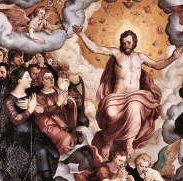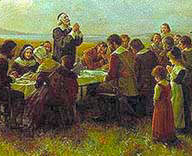The Monsaric Office of Second Readings offers agenerous selection of iptions.
In fact the Breviary already has the most favoured Redind is from Saint Bernard, as below.
iBreviary
Friday, 1 November 2013
All Saints
Office of Readings
SECOND READING
From a sermon by Saint Bernard, abbot
(Sermo 2: Opera omnia, Edit Cisterc 5 [1968], 364-368)
Let us make haste to our brethren who are awaiting us
Why should our praise and glorification, or even the celebration of this feast day mean anything to the saints? What do they care about earthly honors when their heavenly Father honors them by fulfilling the faithful promise of the Son? What does our commendation mean to them?
The saints have no need of honor from us; neither does our devotion add the slightest thing to what is theirs
Clearly, if we venerate their memory, it serves us, not them
But I tell you, when I think of them, I feel myself inflamed by a tremendous yearning.
Calling the saints to mind inspires, or rather arouses in us, above all else, a longing to enjoy their company, so desirable in itself
We long to share in the citizenship of heaven, to dwell with the spirits of the blessed, to join the assembly of patriarchs, the ranks of the prophets, the council of apostles, the great host of martyrs, the noble company of confessors and the choir of virgins
In short, we long to be united in happiness with all the saints
But our dispositions change
The Church of all the first followers of Christ awaits us, but we do nothing about it
The saints want us to be with them, and we are indifferent
The souls of the just await us, and we ignore them
Come, brothers, let us at length spur ourselves on
We must rise again with Christ, we must seek the world which is above and set our mind on the things of heaven
Let us long for those who are longing for us, hasten to those who are waiting for us, and ask those who look for our coming to intercede for us
We should not only want to be with the saints, we should also hope to possess their happiness
While we desire to be in their company, we must also earnestly seek to share in their glory
Do not imagine that there is anything harmful in such an ambition as this; there is no danger in setting our hearts on such glory.
When we commemorate the saints we are inflamed with another yearning: that Christ our life may also appear to us as he appeared to them and that we may one day share in his glory
Until then we see him, not as he is, but as he became for our sake
He is our head, crowned, not with glory, but with the thorns of our sins
As members of that head, crowned with thorns, we should be ashamed to live in luxury; his purple robes are a mockery rather than an honor
When Christ comes again, his death shall no longer be proclaimed, and we shall know that we also have died, and that our life is hidden with him
The glorious head of the Church will appear and his glorified members will shine in splendor with him, when he forms this lowly body anew into such glory as belongs to himself, its head.
Therefore, we should aim at attaining this glory with a wholehearted and prudent desire
That we may rightly hope and strive for such blessedness, we must above all seek the prayers of the saints
Thus, what is beyond our own powers to obtain will be granted through their intercession.
RESPONSORY
Revelation 19:5, 6; Psalm 33:1
Solemnity of All Saints
Today, November 1st, the Church celebrates the Solemnity of All Saints. Who are these “Icons of Human Love,” as Father Thomas Dubay, S.M. called them in
Saints: A Closer Look? They are those “who have lived upon earth as we have, who have known our miseries, our difficulties, our struggles,” writes Father Gabriel of St. Mary Magdalene, O.C.D. in
Divine Intimacy. Some are easy to recognize, “for the Church has raised them to the honor of the Altar, but the great majority are entirely unknown to us. They are humble people who lived obscurely in the accomplishment of duty, without display; without renown, whom no one here below remembers, but whom the heavenly Father looked upon, knew in secret, and, having proved their fidelity, called to His glory.”
St. Bernard, the Abbott, tells us that it doesn’t serve them at all for us to venerate them…but it serves us: “Calling the saints to mind inspires, or rather arouses in us, above all else, a longing to enjoy their company…[and a desire] that Christ our life may also appear to us as he appeared to them and that we may one day share in his glory” (from Sermo 2, Opera omnia, Edit. Cisterc. 5 [1968] 364-368; Second Reading, Liturgy of the Hours).
So, today, let us honor all the Saints and ask for their prayers and intercession. We look to them as examples of conversion, self-giving, sacrifice and piety, as examples of how to love as Christ loved…through the narrow gate of the Cross, so as to be happy with Him forever in heaven, sharing in that eternal joy of praising and of glorifying God.
Art: Icon of All Saints, Siemeon Khromoy, ca 1616; PD-US; copyright expired; Wikimedia Commons.
 (Vatican Radio) At his weekly General Audience on Wednesday, Pope Francis continued his series of catechetical reflections on the Creed, focusing this week on the Communion of Saints. In the English-language synthesis of the Holy Father’s remarks read out following the main catechesis in Italian, Pope Francis writes, “The Catechism of the Catholic Church reminds us that the Communion of Saints is a communion “in holy things” and “among holy persons” (No. 948).
(Vatican Radio) At his weekly General Audience on Wednesday, Pope Francis continued his series of catechetical reflections on the Creed, focusing this week on the Communion of Saints. In the English-language synthesis of the Holy Father’s remarks read out following the main catechesis in Italian, Pope Francis writes, “The Catechism of the Catholic Church reminds us that the Communion of Saints is a communion “in holy things” and “among holy persons” (No. 948).



 During November, as in all of Ordinary Time (Time After Pentecost), the Liturgy signifies and expresses the regenerated life from the coming of the Holy Spirit, which is to be spent on the model of Christ's Life and under the direction of His Spirit. As we come to the end of the Church year we are asked to consider the end times, our own as well as the world's. The culmination of the liturgical year is the Feast of Christ the King. "This feast asserts the supreme authority of Christ over human beings and their institutions.... Beyond it we see Advent dawning with its perspecitive of the Lord's coming in glory."— The Liturgy and Time, A.G. Mortimort
During November, as in all of Ordinary Time (Time After Pentecost), the Liturgy signifies and expresses the regenerated life from the coming of the Holy Spirit, which is to be spent on the model of Christ's Life and under the direction of His Spirit. As we come to the end of the Church year we are asked to consider the end times, our own as well as the world's. The culmination of the liturgical year is the Feast of Christ the King. "This feast asserts the supreme authority of Christ over human beings and their institutions.... Beyond it we see Advent dawning with its perspecitive of the Lord's coming in glory."— The Liturgy and Time, A.G. Mortimort The national holiday (USA) of Thanksgiving also falls on the last Thursday of November. There is a special liturgy which may be used on this day. (Read more
The national holiday (USA) of Thanksgiving also falls on the last Thursday of November. There is a special liturgy which may be used on this day. (Read more 




